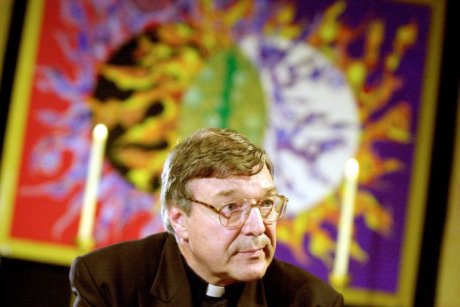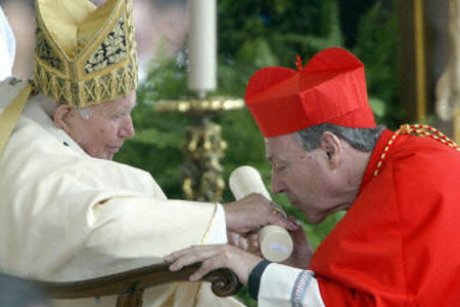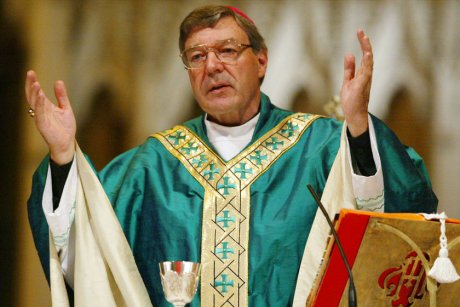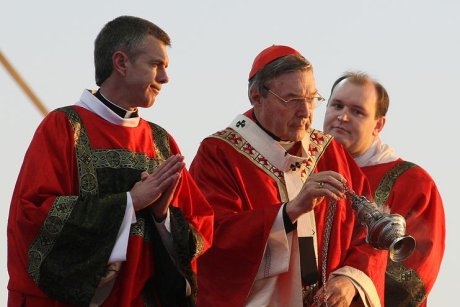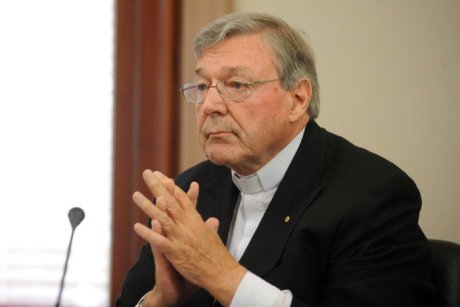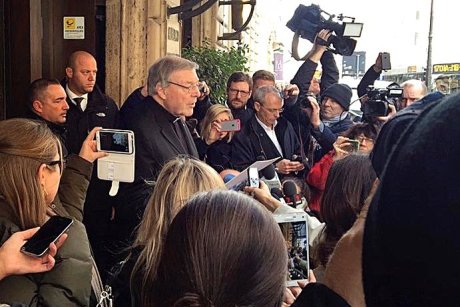George Pell's Career in the Catholic Church
ABC News
Cardinal George Pell has been one of most prominent and controversial figures in the Australian Catholic Church for decades. Take a look at his career from regional Victorian priest to one of the most senior people at the Vatican. Pell's introduction to the Church George Pell was born in 1941 in Ballarat and grew up in the western Victorian city, where he attended the Loreto and St Patrick's colleges. He began his studies into priesthood at Corpus Christi College in Werribee and later travelled to Rome to study at the Propaganda Fide College. In 1966 he was ordained as a Catholic priest and began his work in the Ballarat Diocese. Over the next 20 years he was heavily involved in Catholic Church organisations, including the Catholic education sector. He was a founding member of the Catholic Education Commission of Victoria in the 1970s and was principal of the Institute of Catholic Education (now part of the Australian Catholic University). Cardinal Pell also took on the position of chairman at the Church's international aid agency Caritas Australia in 1988 and continued in the role until 1997. Elevation within the Church In 1987 Cardinal Pell became an Auxiliary Bishop of the Archdiocese of Melbourne, working under Archbishop Sir Frank Little. He took over the position of Archbishop of Melbourne in 1996, under the appointment of Pope John Paul II and remained in this position until 2001, when he was elevated to the Metropolitan Archbishop of Sydney. As Archbishop of Melbourne in 1996, Cardinal Pell established the Catholic Church's Melbourne Response, for responding to child sexual abuse claims.
In 2003 Pope John Paul II appointed Cardinal Pell to the Sacred College of Cardinals, who are also known as princes of the Church. This elevation meant Cardinal Pell would play a vital role in appointing the Pope's successor. In the same year he was awarded the Centenary Medal by the Australian Government for services to the country. In 2005 Cardinal Pell was recognised in the Queen's Birthday Honours and was made a Companion in the Order of Australia for his service to the Catholic Church in Australia. After the death of Pope John Paul II in 2005, Cardinal Pell travelled to Rome as the only Australian member of the Catholic Church with the right to vote for the new pope. When Pope Benedict XVI was elected, Cardinal Pell said he believed the new Pope's approach had the potential to increase church attendance in the West. In 2013, Pope Benedict XVI made a surprise announcement that he would resign from his position. The Catholic Archbishop of Sydney, Cardinal George Pell
After the appointment of Pope Francis, Cardinal Pell was one of seven selected to advise the Pope on church reforms, aimed at making changes to the Curia which had been blamed for many of the scandals plaguing the Church. At the time Cardinal Pell welcomed the opportunity to offer different perspectives to the Curia. "Most of the people who work in the Curia are fine people. There were one or two mishaps," he said. "I think different perspectives will be useful and I think a few English-speaking perspectives won't hurt." That appointment paved the way for Cardinal Pell to take on a higher position in the Church, culminating in his new appointment as Prefect for the Economy of the Holy See, meaning he would be responsible for preparing the Vatican's annual budget, as well as financial planning and enhanced internal controls. The Cardinal reports directly to the Pope, putting his role on a similar level to that of the Vatican's Secretary of State. Pell no stranger to controversy Cardinal Pell has been an outspoken critic on many social and political issues, and found himself under fire over church procedures.
In 2007 Cardinal Pell was embroiled in a stoush with New South Wales politicians over a bill that would allow stem cell research in the state. He threatened to refuse communion to MPs who voted in support of the bill allowing the practice that he described as "a perverse new direction in human experimentation". "I don't think that any Catholic politician, any Christian politician, any pro-life politician who has properly informed his or her conscience should vote for these changes," he said. The bill was passed by the parliament. Over the years Cardinal Pell has also spoken out against the use of abortion drug RU486, an Australian charter of human rights, and in 2011 backed claims by the Pope that condoms were aggravating the AIDS problem in Africa. "They're encouraging promiscuity because they're encouraging irresponsibility," he said. Pell defends response to abuse claims As allegations of sexual assault within the Catholic Church surfaced, Cardinal Pell found himself under scrutiny for his handling of the issue. As Archbishop of Sydney, he defended his response to allegations of abuse within the Church dating back to the 1960s.
In 2012 he accused the media of a campaign against the Catholic Church, after the Gillard government called for a nation-wide inquiry into institutionalised abuse. "We are not interested in denying the extent of misdoing in the Catholic Church," he said. "We object to [the extent of misdoing] being exaggerated, we object to being described as the only cab on the rank." A year later Cardinal Pell faced the Victorian parliamentary inquiry into child sexual abuse over the Church's systemic cover-up of cases of sexual abuse. He told the inquiry several factors, including celibacy, could have contributed to the high levels of abuse seen in the Victorian Catholic Church. Pell faces child sex abuse royal commission In March 2014, Cardinal Pell appeared before the Royal Commission into Institutionalised Responses to Child Sexual Abuse and was questioned by the commission about his role in instructing lawyers to defend the Church against abuse claims.
During his testimony he issued an apology to former altar boy John Ellis, who was abused by a priest at Bass Hill Parish in the 1970s but lost a legal case against the Church on a technicality in 2007. "I want to acknowledge his suffering and the impact of this terrible affair on his life. As the then-Archbishop, I have to take ultimate responsibility [for the court case], and this I do," he said. He also said abuse victims should be able to sue the Church and told the parents of two child sex abuse victims that the Church would review its compensation payments. Cardinal Pell was recalled by the child sex abuse royal commission and earlier this year gave evidence from Rome via video link, after he was excused from appearing in person due to ill health. Under questioning he said he was not adequately briefed by the Catholic Education Office and Archbishop about abuse in Ballarat and Melbourne while he was a senior priest in regional Victoria in the 1970s and that it was a "disastrous coincidence" that five paedophile priests had been sent to Ballarat. While being asked about the crimes of notorious paedophile priest Gerald Ridsdale he said it was a "sad story" but "not of much interest" to him at the time, prompting gasps from those attending his hearing. Several child sexual abuse survivors travelled to Rome to watch Cardinal Pell give evidence and after his four days of testimony were complete, the Cardinal held a "hard and honest" meeting with the assembled survivors. "I heard each of their stories and of their suffering," he said in a handwritten statement released after the meeting. "I know many of their families and I know of the goodness of so many people in Catholic Ballarat, a goodness that is not extinguished by the evil that was done."
|
.
Any original material on these pages is copyright © BishopAccountability.org 2004. Reproduce freely with attribution.
